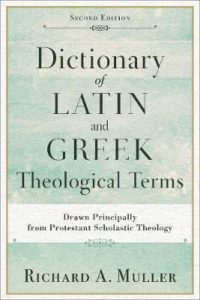
actus purus: pure or perfect actualization or actuality; sometimes actus purissimus: most pure actuality; a term applied to God as the fully actualized being, the only being not in potency; God is, in other words, absolutely perfect and the eternally perfect fulfillment of himself. It is of the essence of God to be actus purus or purissimus insofar as God, self-existent being, is in actu (q.v.), in the state of actualization, and never in potentia (q.v.), in the state of potency or incomplete realization. This view of God as fully actualized being lies at the heart of the scholastic exposition of the doctrine of divine immutability (immutabilitas Dei, q.v.). Immutability does not indicate inactivity or unrelatedness, but the fulfillment of being. In addition, the full actualization of divine being relates strictly to the discussion of God’s being or essence ad intra and in no way argues against the exercise of divine potentia ad extra, potency or power toward externals. In other words, God in himself, considered essentially or personally, is not in potentia because the divine essence and persons are eternally perfect, and the inward life of the Godhead is eternally complete and fully realized. E.g., the generation of the Son does not imply the ontological movement of the Second Person of the Trinity from a state of incomplete realization to a state of perfect actualization. Nonetheless, the relationships of God to the created order, to the individual objects of the divine will ad extra, can be considered in potentia insofar as all such relations depend upon the free exercise of the divine will toward an order of contingent beings drawn toward perfection.
immutabilitas: immutability, changelessness; especially, the immutabilitas Dei, or immutability of God, according to which God is understood as free from all mutation of being, attributes, place, or will, and from all physical and ethical change; or, in other words, the immutabilitas Dei indicates the eternal and perpetual identity of the divine essence with all its perfections. Specifically, immutability of esse indicates the immortalitas (q.v.), or immortality, and incorruptibilitas, or incorruptibility, of God; immutability of attributa or accidentia indicates the changelessness of divine perfections; immutability of locus, or place, refers to the omnipraesentia (q.v.), or omnipresence, of God that fills all things; and immutability of voluntas (q.v.), or will, refers to the divine constancy in all that has been decreed and promised. God, therefore, does not repent; repentance is attributed to God in Scripture by anthropopathy (anthropopatheia, q.v.) and indicates, not a change in God, but rather a changed relationship between God and man. Neither does creation imply a change in God and a denial of immutability. The scholastics distinguish between the principium agendi, or effective principle in creation, which is the divine essence itself, and the effectum productum, or produced effect, in creation, which is the created order. In the produced effect there is clearly change or mutation. The creation is a movement from nonexistence to existence. But in the effective principle, God, there is no change or mutation since God eternally and immutably wills to produce the creation. The change that occurs in creation is external to God.
simplicitas: simplicity; i.e., having an uncompounded or noncomposite nature; especially, the simplicitas Dei according to which God is understood as being absolutely free of any and all composition, not merely physical, but also rational or logical composition. Thus, God is not the sum of the divine attributes (attributa divina, q.v.); the attributes are understood to be identical with and inseparable from the essentia Dei (q.v.). The scholastics observe that if God were even logically or rationally composite, God would necessarily be viewed as a result and in some sense contingent. Simplicity is the guarantee of the absolute ultimacy and perfection of God, so much so that it frequently appears in scholastic systems as the first divine attribute on which a right understanding of all other divine attributes depends.
Source: Richard Muller, Dictionary of Latin and Greek Theological Terms (Baker, 1985), pp. 24, 148, 283.